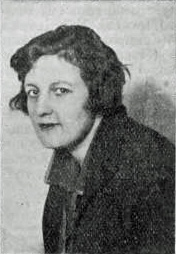Lyudmila Rudenko
| Lyudmila Rudenko | |
|---|---|
 Lyudmila Rudenko circa 1928 | |
| Full name | Lyudmila Vladimirovna Rudenko |
| Country | Soviet Union |
| Born | 27 July 1904 Lubny, Poltava Governorate, Russian Empire (present-day Ukraine) |
| Died | 4 March 1986 (aged 81) Leningrad, Soviet Union |
| Title | International Master (1950) Woman Grandmaster (1976) |
| Women's World Champion | 1950–53 |
Lyudmila Vladimirovna Rudenko (Template:Lang-ru, Template:Lang-uk; 27 July 1904 – 4 March 1986) was a Soviet chess player and the second women's world chess champion, from 1950 until 1953.[1]
She was awarded the FIDE titles of International Master (IM) and Woman International Master (WIM) in 1950, and Woman Grandmaster (WGM) in 1976. She was the first woman awarded the International Master title.[2] Rudenko was also USSR women's champion in 1952.
Early life and swimming career
Rudenko was born in 1904 in Lubny, in the Poltava region of what is now Ukraine.[2] At age 10, Rudenko was taught how to play chess by her father—although, at first, she was more interested in swimming.[3] After secondary school, she moved to Odessa and took a degree in economics. Rudenko became the swimming champion of Odessa in the 400-metre (1,300 ft) breaststroke. In 1925, she was swimming vice-champion of Ukraine (breaststroke).[2] She started a career as an economic planner for the Soviet Union, and chess became a hobby.[2][3][4]
Chess career
Rudenko began playing tournament chess in 1925 after a move to Moscow.[3] In 1928, she won the Moscow women's championship. She then moved to Leningrad,[2] where she met and married scientist Lev Davidovich Goldstein; in 1931 they had a son.[4] In Leningrad in 1929 she began training with chess master Peter Romanovsky. She won the Leningrad women's championship three times.
In World War II, Rudenko organized a train to evacuate children from the Siege of Leningrad. She described this as the most important accomplishment in her life.[2]
Women's World Champion Vera Menchik died in 1944 during an air raid. After the war, in the winter of 1949–1950, the World Chess Federation FIDE held a tournament in Moscow to determine the new women's champion. Sixteen women from twelve countries competed, with the four Soviet players taking the top four spots.[citation needed]
At the time Rudenko was roughly 40 years old, and she won (scoring nine wins, one loss, and five draws).[citation needed]
She held the Women's World Championship title until losing it to Elisaveta Bykova in 1953 in the next championship cycle. Her score was 6–8 (five wins, seven losses, and two draws).[citation needed]
Rudenko's post-war chess trainers were Alexander Tolush and Grigory Levenfish.[citation needed]
Legacy
Rudenko was inducted into the World Chess Hall of Fame in 2015.[5] She was honored with a Google Doodle on the 114th anniversary of her birth, 27 July 2018.[6]
References
- ^ Graham, John (1987). Women in Chess, Players of the Modern Age. McFarland & Company.
- ^ a b c d e f "Five things you didn't know about the inspirational Soviet chess supremo". The Independent. Retrieved 28 July 2018.
- ^ a b c "Google Doodle Celebrates Chess Grandmaster Lyudmila Rudenko's on What Would Have Been Her 114th Birthday". Time. Retrieved 28 July 2018.
- ^ a b "Chess Master Lyudmila Rudenko's Greatest Accomplishment Had Nothing to Do With Chess". Inverse. Retrieved 28 July 2018.
- ^ "Lyudmila Rudenko (1904-1996)". World Chess Hall of Fame. 2015.
- ^ "Google Doodle Celebrates Chess Grandmaster Lyudmila Rudenko's on What Would Have Been Her 114th Birthday". Retrieved 27 July 2018.
External links
- "Chess Goddesses. Ludmilla Vladmirovna Rudenko". Goddesschess. Archived from the original on 12 October 2011.
- E. Bishard about L. Rudenko. e3e5.com.
- Lyudmila Rudenko player profile and games at Chessgames.com
